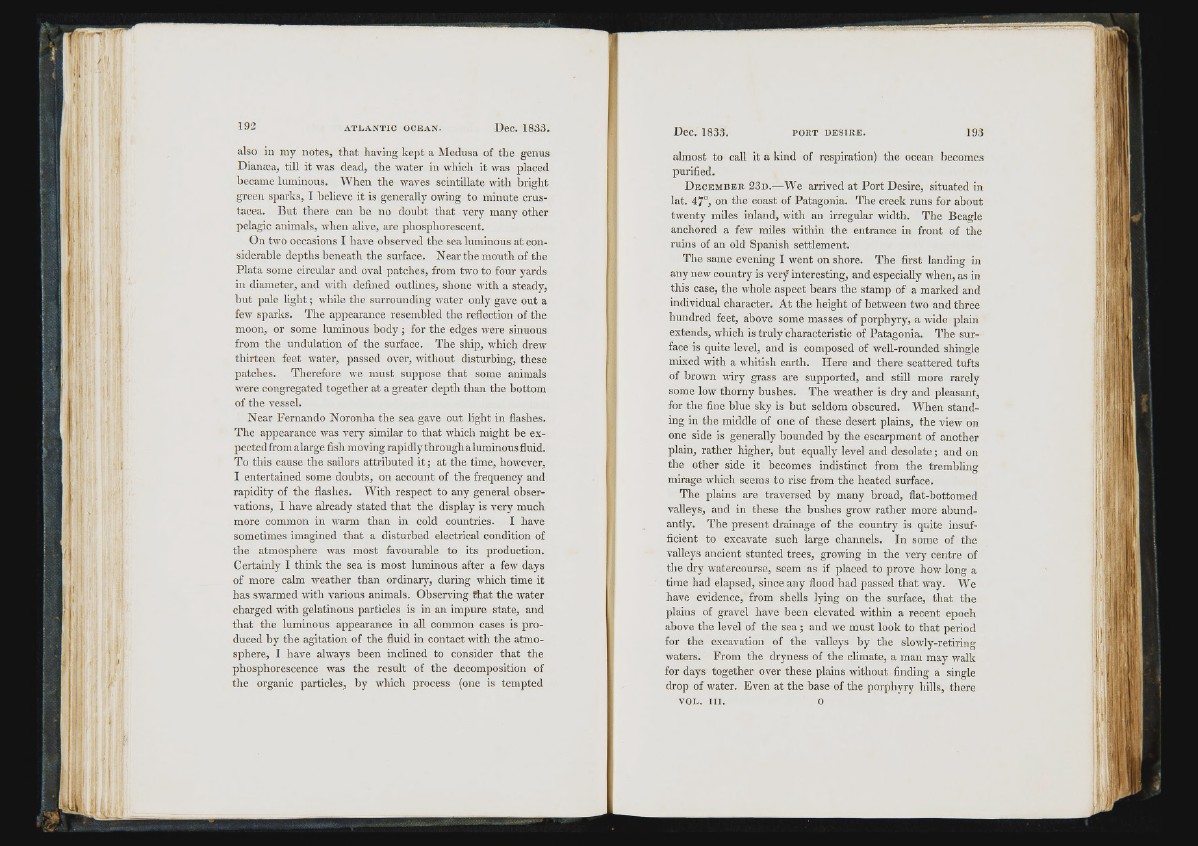
I !
also in my notes, that having kept a Medusa of the genus
Dianoea, till it was dead, the water in which it was placed
became luminous. When the waves scintillate with bright
green sparks, I believe it is generally owing to minute Crustacea.
But there can be no doubt that very many other
pelagic animals, when alive, are phosphorescent.
On two occasions I have observed the sea luminous at considerable
depths beneath the surface. Near the mouth of the
Plata some circular and oval patches, from two to four yards
in diameter, and with defined outlines, shone with a steady,
but pale light; while the surrounding water only gave out a
few sparks. The appearance resembled the reflection of the
moon, or some luminous body ; for the edges were sinuous
from the undulation of the surface. The ship, which drew
thirteen feet water, passed over, without disturbing, these
patches. Therefore we must suppose that some animals
were congregated together at a greater depth than the bottom
of the vessel.
Near Fernando Noronha the sea gave out light in flashes.
The appearance was very similar to that which might be expected
from alarge fish moving rapidly through a luminous fluid.
To this cause the sailors attributed i t ; at the time, however,
I entertained some doubts, on account of the frequency and
rapidity of the flashes. With respect to any general observations,
I have already stated that the display is very much
more common in warm than in cold countries. I have
sometimes imagined that a disturbed electrical condition of
the atmosphere was most favourable to its production.
Certainly I think the sea is most luminous after a few days
of more calm weather than ordinary, during which time it
has swarmed with various animals. Observing (hat the water
charged with gelatinous particles is in an impure state, and
that the luminous appearance in all common cases is produced
by the agitation of the fluid in contact with the atmosphere,
I have always been inclined to consider that the
phosphorescence was the result of the decomposition of
the organic particles, by which process (one is tempted
almost to call it a kind of respiration) the ocean becomes
purified.
D e c e m b e r 2 3 d .—We arrived at Port Desire, situated in
lat. 47°, on the coast of Patagonia. The creek runs for about
twenty miles inland, with an irregular width. The Beagle
anchored a few miles within the entrance in front of the
ruins of an old Spanish settlement.
The same evening I went on shore. The first landing in
any new country is very interesting, and especially when, as in
this case, the whole aspect bears the stamp of a marked and
individual character. At the height of between two and three
hundred feet, above some masses of porphyry, a wide plain
extends, which is truly characteristic of Patagonia. The surface
is quite level, and is composed of well-rounded shingle
mixed with a whitish earth. Here and there scattered tufts
of brown wiry grass are supported, and still more rarely
some low thorny bushes. The weather is dry and pleasant,
for the fine blue sky is but seldom obscured. When standing
in the middle of one of these desert plains, the view on
one side is generally bounded by the escarpment of another
plain, rather higher, but equally level and desolate; and on
the other side it becomes indistinct from the trembling
mirage which seems to rise from the heated surface.
The plains are traversed by many broad, flat-bottomed
valleys, and in these the bushes grow rather more abundantly.
The present drainage of the country is quite insufficient
to excavate such large channels. In some of the
valleys ancient stunted trees, growing in the very centre of
the dry watercourse, seem as if placed to prove how long a
time had elapsed, since any flood had passed that way. We
have evidence, from shells lying on the surface, that the
plains of gravel have been elevated within a recent epoch
above the level of the sea ; and we must look to that period
for the excavation of the valleys by the slowly-retiring
waters. From the dryness of the climate, a man may walk
for days together over these plains without finding a single
drop of water. Even at the base of the porphyry hills, there
VOL. I I I . O
¡1,